-
Iran threatened to halt nuke talks if U.S. bombed Assad, WSJ reporter says
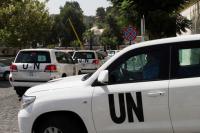
President Barack Obama changed his mind about launching a retaliatory strike against Syrian President Bashar al-Assad, whose forces carried out a sarin gas attack that killed more than 1,400 people in August 2013, after Iran threatened to pull out of then-secret nuclear talks, the chief foreign correspondent for the Wall Street Journal said on Monday.
-
-
Secret side deal cuts Iran’s breakout time in half in little more than a decade
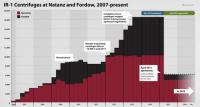
Key restrictions on Iran’s nuclear program will ease in slightly more than a decade, cutting in half the time Iran would need to build a nuclear weapons. The AP had obtained a document from a source inside the IAEA — a document which was the only secret portion to last year’s agreement between Iran and the P5+1 powers. The document said that after a period of between eleven to thirteen years, Iran could replace its 5,060 older, and inefficient, centrifuges with up to 3,500 advanced centrifuges.
-
-
Senators supporting Iran nuclear deal urging greater transparency in reporting on Iran’s nuclear program
Senator Gary Peters ((D-Michigan) on Friday led fourteen of his colleagues in sending a letter to President Barack Obama urging the administration to work with the International Atomic Energy Agency (IAEA) to encourage additional transparency when reporting on Iran’s nuclear program.
-
-
White House: Uranium discovered by IAEA likely tied to Iran’s nuclear weapons program

Obama administration officials concluded that particles of uranium found at Iran’s Parchin military base and revealed in the International Atomic Energy Agency’s final report on the country’s past nuclear activities were likely tied to the regime’s nuclear weapons program. The admission further underscores concerns that the IAEA’s investigation into Iran’s nuclear activities at Parchin should not have been closed following the report’s publication.
-
-
FARC to free last child soldiers
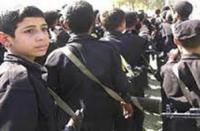
The FARC, Colombia’s largest rebel group, has said it will release all child soldiers under 15 years of age, thus ending an especially poignant chapter in the country’s 5-decade conflict. The FARC announcement comes as the negotiations between the rebel group and the Colombian government are continuing in Havana under the auspices of the UN. FARC made extensive use of children between 8 and 16 – what the organization called “pisa suaves” – to sneak into military camps, police stations, and other government facilities to set bombs and other types of booby traps.
-
-
ISIS obtaining nuclear weapons “obviously a concern”: British defense secretary

British defense secretary Michael Fallon said the prospect of ISIS or another terror group with the “technical know-how” obtaining nuclear weapons is “obviously a concern.” Fallon said it was important to ensure that terror groups could not “get their hands on nuclear weapons” and said the United Kingdom was doing its part by maintaining strict export controls on the necessary technology.
-
-
Ending civilian use of highly enriched, weapon-grade uranium
Efforts to convert civilian research reactors from weapon-grade highly enriched uranium (HEU) to low enriched uranium (LEU) fuels are taking significantly longer than anticipated, says a report from the National Academies of Sciences. The report calls for the federal government to take immediate steps to convert civilian research reactors currently using weapon-grade HEU fuel to a lower-enriched HEU fuel while awaiting the qualification of new LEU fuel.
-
-
Iran nuclear deal: how to ensure compliance?
The U.S. and European countries lifted nuclear-related sanctions against Iran on 16 January as part of a deal in which the country agreed to limit its nuclear activities and accept a new system of international inspections. The issue now is how the international community can be confident that Iran is not violating the deal. Iran agreed never to develop nuclear weapons when it signed the Nuclear Non-Proliferation Treaty in 1968. There’s no ironclad method to prevent Iran from breaking its promise and developing nuclear weapons, but this new agreement builds in a number of strong protections. In conjunction with U.S. and allied intelligence capabilities, these rules mean even a sophisticated and carefully executed secret plan would carry a high risk of detection.Looking at the deal as a whole, Iran’s best strategy for acquiring nuclear weapons would simply be to wait for restrictions on its declared enrichment program to be lifted. Assuming that the deal does not fall apart sooner, most of those provisions are scheduled to expire in 2030. In the meantime, the deal helps make a nuclear-armed Iran a less immediate prospect.
-
-
It is 3 minutes to midnight -- still

The Bulletin of the Atomic Scientists yesterday announced that the minute hand of the Bulletin’s closely watched Doomsday Clock will remain at three minutes to midnight, since recent progress in the Iran nuclear agreement and the Paris climate accord “constitute only small bright spots in a darker world situation full of potential for catastrophe.” The Bulletin’s panel of security experts said that “Three minutes (to midnight) is too close. Far too close…” – but that this reflects “world leaders continue to fail to focus their efforts and the world’s attention on reducing the extreme danger posed by nuclear weapons and climate change. When we call these dangers existential, that is exactly what we mean: They threaten the very existence of civilization and therefore should be the first order of business for leaders who care about their constituents and their countries.”
-
-
Iran decommissions Arak nuclear reactor
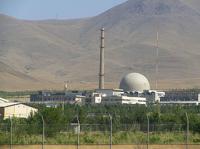
Iran has decommissioned its Arak nuclear reactor by removing the sensitive core, and UN inspectors are inspecting the reactor today (Thursday) in order to verify the removal of the core, as required by the nuclear agreement between Iran and the P5+1 powers. The removal of the core of the reactor will make it impossible for Iran to pursue the plutonium path to the bomb. The dismantling of about 13,000 uranium enrichment centrifuges, as called for by the agreement, will make it impossible for Iran to use enriched uranium to build a bomb for the duration of the agreement.
-
-
Seismologists "hear" the nuclear explosions in North Korea

International experts are far from convinced that North Korea actually conducted its first H-bomb test, which was reported by the country last week.Seismology alone cannot tell whether it was a hydrogen bomb or not, but seismologists say that what emerges from the existing data is that last week’s seismic events in North Korea were slightly smaller than a similar event in 2013.
-
-
U.S. to impose new sanctions on Iran over ballistic missile program
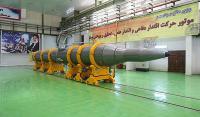
The United States is preparing a new round of economic sanctions against Iran after Iran had violated agreements related to its ballistic missile program by testing, on 10 October, an advanced version of one of its missiles. The ballistic missile agreement is unrelated to the nuclear agreement the P5+1 powers signed with Iran last summer. The nuclear program-related sanctions would begin to be lifted in 2016 if Iran fully complies with the requirements of the nuclear deal.
-
-
Iran began dismantling its nuclear program, but has way to go to come into full compliance: IAEA

The IAEA says that Iran has begun dismantling parts of its nuclear program, as agreed in a deal with the P5+1 powers – but that it has some way to go before coming into full compliance with the agreement. Iran has removed 4,500 centrifuges from the Natanz and Fordo site – but it has to remove 10,000 more before 15 December. Iran has added 460 kg low-enriched uranium to its stock – it now has 8.3 tons of low-enriched uranium – but that stock must be slashed to just 300kg by 15 December. If Iran does not meet in full these, and other, clauses in the agreement by 15 December, the economic sanctions will not be lifted.
-
-
Can Iran’s rulers still use enemies abroad to rally nation?

The rulers of the Islamic Republic of Iran have routinely used external conflicts to divert public attention from domestic problems, deflect attacks, promote national cohesion, and repress their opponents. Democratic activists in Iran may hope that the signing of the international nuclear deal will curb the country’s regime from further militarizing the state and repressing the opposition, but it is more likely that Iran’s leadership will continue their contentious pattern, and continue their anti-American and anti-Israeli rhetoric. With the nuclear agreement or without it, the theocracy’s history suggests that its leaders are more likely to focus on external conflicts in order to shore up their power base, deflect attacks, divert attention from unresolved internal problems and repress demands for democracy.
-
-
GOP caucus infighting stymies House vote on Iran deal

The Senate is not likely to bring the Iran nuclear deal to the floor of the Senate for an up-or-down vote because forty-two Democrats have now announced their support for the deal. It now appears that the House will not vote on the Iran deal, either, but for a different reason: Infighting among House Republicans who oppose the deal. The more conservative members of the House GOP caucus say the Obama administration had not provided all the required information about the deal. Opponents of the deal insist it includes “secret side deals” about nuclear inspections, side deals which have not been revealed either to the public or to lawmakers. The critics say that the review act, which gave Congress 60-day window to debate and vote on the deal, has not been triggered on 19 July, as the administration insists, since the act required all the information and documents pertaining to the deal to be given to Congress. Since, they argue, not all the documents have been given to Congress, not only has the review act has not been triggered on 19 July – and cannot close on 17 September – but there should be not vote of approval or disapproval.
-
- All
- Regional
- Water
- Biometrics
- Borders/Immig
- Business
- Cybersecurity
- Detection
- Disasters
- Government
- Infrastructure
- International
- Public health
- Public Safety
- Communication interoperabillity
- Emergency services
- Emergency medical services
- Fire
- First response
- IEDs
- Law Enforcement
- Law Enforcement Technology
- Military technology
- Nonlethal weapons
- Nuclear weapons
- Personal protection equipment
- Police
- Notification /alert systems
- Situational awareness
- Weapons systems
- Sci-Tech
- Sector Reports
- Surveillance
- Transportation
Advertising & Marketing: advertise@newswirepubs.com
Editorial: editor@newswirepubs.com
General: info@newswirepubs.com
2010-2011 © News Wire Publications, LLC News Wire Publications, LLC
220 Old Country Road | Suite 200 | Mineola | New York | 11501
Permissions and Policies
Editorial: editor@newswirepubs.com
General: info@newswirepubs.com
2010-2011 © News Wire Publications, LLC News Wire Publications, LLC
220 Old Country Road | Suite 200 | Mineola | New York | 11501
Permissions and Policies
